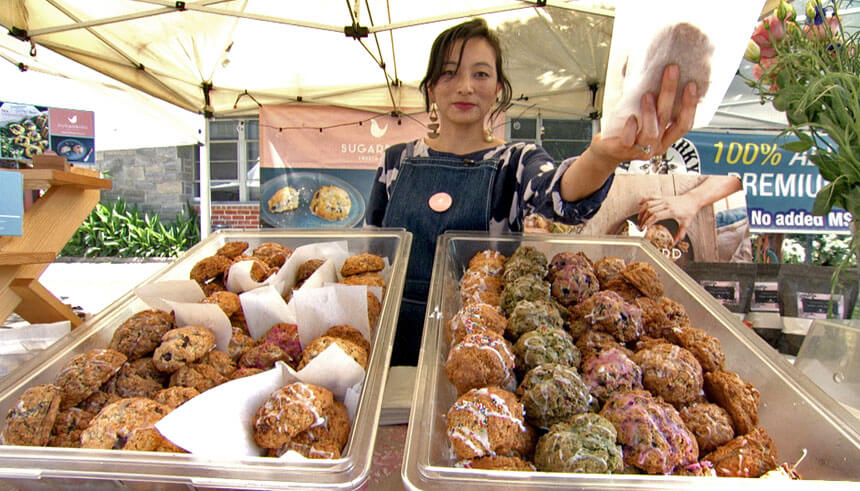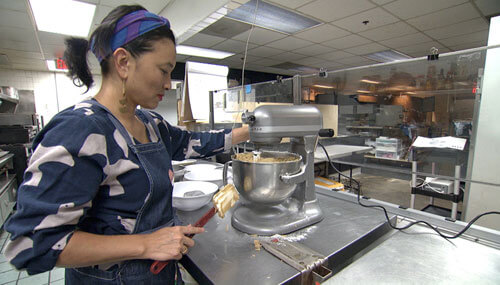Insights
Raising Capital to Take a Sweet Business to the Next Level
By Daisy Lin

How Sugarbird Sweets’ founder found a niche and raised capital to grow her business.
“Opening a business is like giving birth to and raising a child: no one really tells you what to expect,” says Kei Okumura, founder and owner of Sugarbird Sweets and Teas. “It is challenging, rewarding, sometimes very lonely.”
Okumura, a mother of two, nurtures and grows her business like one of her children. Every morning, after she packs lunch for her boys, she heads to her commercial kitchen in downtown Los Angeles and assembles the ingredients—butter, sugar, flour, eggs, and more—from which she creates fluffy scones that she pairs with her custom tea blends.
“They’re crunchy on the outside and moist in the center,” Okumura says. “So we get a lot of people coming back going, 'What are these? This is the best scone I’ve ever tasted.”
Hours later, the scones are on display at a farmers’ market. That day, a woman approached the stand and told Okumura she just got off a plane and planned her trip so that she can come straight to the market to buy her scones.
Turns out, scones can leave quite an impression—and make quite a profit. From its founding 10 years ago, Sugarbird has evolved from a stand at the farmers’ market into a catering operation, and now has a wholesale distributor to help scale mass distribution to hotels, cafes, and restaurants nationwide. Thanks to the growing popularity of food delivery services, Okumura is also launching an online retail presence, as well as a local delivery option.
“We’re at this tipping point,” Okumura says. “It’s a lot of work, and it takes a lot of steps. You need to know the right people, you need to really seek out the right person to ask those questions, to form a bond with, and be in business with. And no one really [teaches] you that—you learn as you go, with trial and error.”
Finding a niche
It all started after the September 11 attacks. “That triggered a lot of emotions. I needed to get away,” Okumura says. She left her job in the film industry for Paris and the prestigious École Supérieure de Cuisine Française, Ferrandi, to pursue her passion for baking. After graduating, she worked at a number of upscale restaurants before establishing Sugarbird Sweets and Teas, starting with her tea blends.
She soon realized she needed to introduce a product that people would want to buy more often. When she came across a unique scone recipe, she realized it went perfectly with her teas, and that the pairing would create an afternoon tea party theme, which she could develop into a brand for a catering business. Starting with two flavors of scones, she gradually expanded to 18 flavors, including one with a special twist.
“I wanted to incorporate my background, being Japanese, [and incorporate] teas into my baked goods. So, I came out with a matcha white chocolate scone—it really stands out from the rest,” Okumura shares.

The distinctiveness of the green scone caught customers’ attention and became a signature item. Okumura is also constantly integrating new products. Word spread, and hotels and restaurants started requesting her products. “Every step of the way I needed to expand, adapt, evolve and find a unique niche that makes us different, and still keep up with the trends of what’s out there,” she said.
Raising capital
When Okumura created a storefront location in downtown LA, she needed more capital to keep operations going. She enrolled in the Goldman Sachs 10,000 Small Businesses Program, a 16-week intensive curriculum that provides small business owners with a practical business education, including accounting, negotiating, marketing and human resources. Participants are exposed to a variety of lending options and develop a growth plan for their businesses. They also learn how to better pitch their plan and secure funding, and get introduced to various loans and options that are available.
“I had no idea there were special loans available for small businesses, especially for women, minorities. I believed that you either had it or had rich relatives,” Okumura says.
One of the financial options she found out about was the U.S. Small Business Administration’s Community Advantage Loan Program, which granted her a loan to help her expand her catering business.
“If you look hard enough, I believe there are many grants and special loans available for circumstances, so it’s always best to ask. If we don’t ask, it won’t appear,” Okumura says.

“I had no idea there were special loans available for small businesses, especially for women, minorities.”
She also received a microloan from East West Bank to help pay for bulk purchases that the business needed for growth, when they foresaw possible cash flow issues while ramping up. “It really helped us go over the hump of our growth and kept us afloat,” Okumura explains.
Sherrie Carr, East West Bank Downtown LA branch manager, says that usually small business term loans of up to $50,000 can help entrepreneurs with capital needs that can launch them to the next level. “This is great for up-and-coming small businesses. Entrepreneurs don’t have a huge amount of credit, [nor] the cash flow that traditional businesses have [because] they’re just starting out. So, we’re looking at their personal credit, and the ability to pay back,” Carr says. “We have many different options that we try to customize to clients.”
Both talk more about it here:
Networking with other entrepreneurs
Okumura encourages entrepreneurs to network with their peers, and meets with a group of fellow bakers, restaurateurs, and business owners regularly. It’s an open exchange where members share battle stories, tips and insights with each other.
“It’s hard to have people be open about some of the things we deal with as entrepreneurs, and having a safe group that allows you to share tips on vendors, new laws, fads, marketing ideas [helps] all of us so we can better market ourselves,” Okumura says.
She also credits Carr for introducing her to other business owners and helping to expand her network.
“I have a few friends and mentors who have supported me, given me guidance on all the pitfalls, all the trials and errors that they’ve gone through, and sharing those so I wouldn’t do the same,” Okumura says. “There are always stories that make you feel like you’re not alone on this journey.”
Subscribe to the Reach Further Newsletter
Get inspiring stories in your inbox every month.

